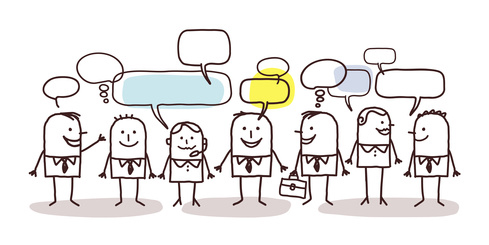Inside the Brain of a Chatty Cathy

People devote over 30-40% of every day speech to describing their private experiences or personal relationships. Social media sites like Facebook and Twitter capitalize on this desire humans have to talk about themselves. Posting statuses and tweets about pretty personal information like relationships and emotions is commonplace. People let others know where they are by checking into places on Foursquare. They take pictures with Instagram to share them with friends and followers. All of these sites represent a medium through which individuals share things about themselves. One recent survey of Internet use found that 80% of posts to social media sites consist simply of announcements about one’s own immediate experiences.
It’s well-established that people like to talk about themselves, but it’s not as clear why. A recent study sought to examine the brain science behind personal disclosure. The study’s researchers aimed to determine whether brain regions associated with reward become engaged when people are presented with opportunities to talk about themselves.
Researchers imaged the brains of participants as these people talked about their own beliefs and opinions and as they judged the beliefs of others. When individuals spoke about themselves, activity in areas of the brain associated with reward and pleasure increased. These regions of the brain are part of the mesolimbic dopamine system, which also responds to rewards such as food and money.
Researchers also performed tests in which participants could chose to answer questions about themselves (and receive a small monetary reward) or answer questions about other people (and receive a bigger monetary reward). People opted for a lower payoff and chose to talk about themselves, and they actually gave up on average 17% in potential earnings so they could disclose personal information.
The bottom line: disclosing personal beliefs and opinions is intrinsically rewarding, and it triggers the same reward feeling people get from things such as food and money. It’s so rewarding that people willingly forego money to talk about themselves.
Interestingly, listening (the exact opposite of talking) can be rewarding as well. Listening is a form of compassion and allows us to give some help and assistance to others. Neuroscientists from Emory University recorded brain activity of people who were given the chance to help someone else. Helping others triggered activity in the caudate nucleus and anterior cingulate, portions of the brain that turn on when people receive rewards or experience pleasure, which lead researchers to conclude that helping others brings the same pleasure we get from the gratification of personal desire.
The fact that both talking and listening are rewarding is good news, because striking a balance between the two activities is ideal. It’s incredibly frustrating to have a conversation with someone who is incessantly trying to one-up us (aka insert information about themselves into the conversation at every chance). And, on the other hand, if we’re always listening to other people but never sharing our own feelings/beliefs, we might begin to feel worn down. So, talk and listen—and reap some feel-good benefits by doing both!
Olivia Roat is a reporter for GoStrengths.com, a site dedicated to helping teens increase their resilience skills and bounce back from any adversity!